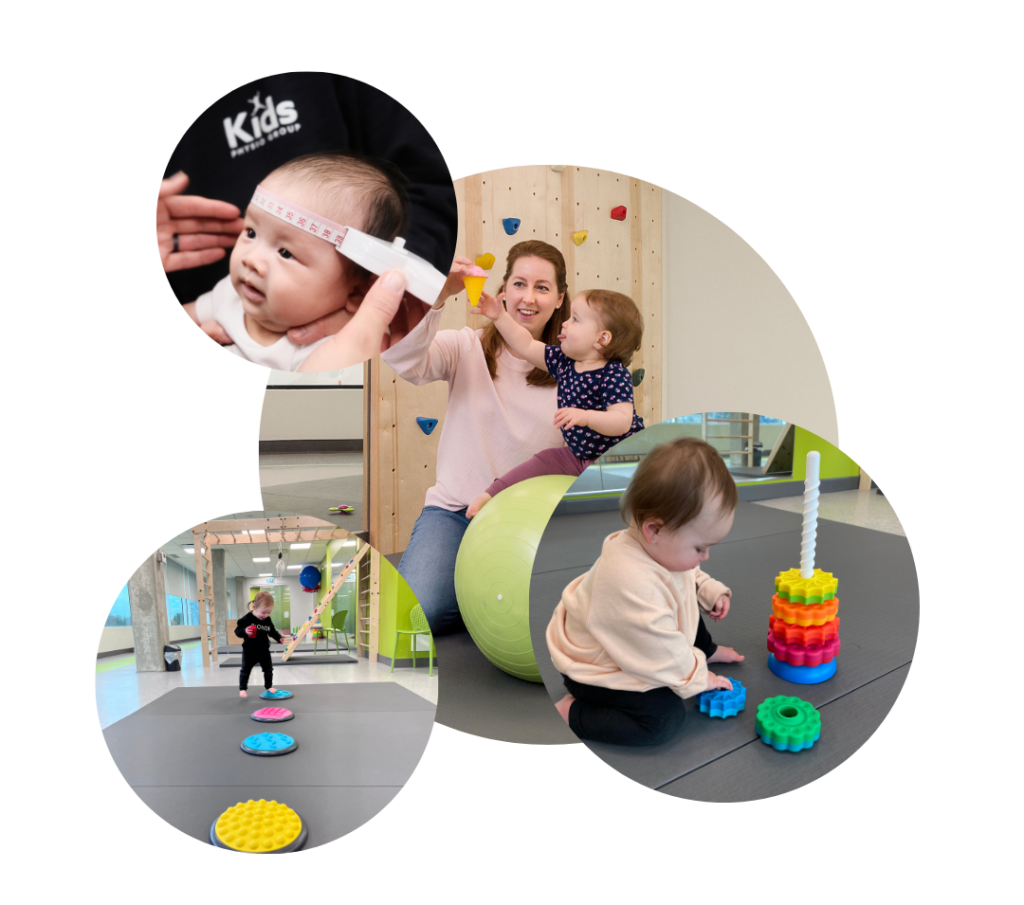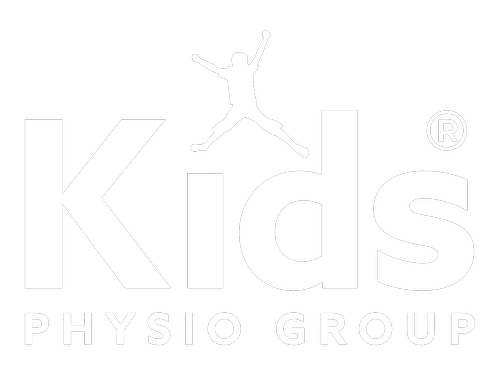Infant Physiotherapy
Physiotherapy is for babies and toddlers too! Kids Physio Group’s physiotherapists are experts in infant motor development and offer specialized services just for babies and toddlers. For many infant conditions, physiotherapy management is very effective – especially when started early. See below for our services and some conditions that may warrant a visit to Kids Physio for your infant.
During an infant assessment, your physiotherapist will do a thorough screening of your infant’s development including motor milestones, tummy time challenges, range of motion, one-sided preferences, reflexes, and more!
These 1:1 appointments can be booked if you are noticing concerns with your infant’s development, or for proactive motor milestone check-ups. It can be tricky to identify if your infant is on track, and our experts can happily answer any questions and provide activities to work on at home to support your baby’s development.
Infant Physiotherapy
Head Shape Management
Infants are born with very soft skulls which are easily misshapen by pressure during sleep and other activities on their back. Head shape can also be affected by the birth process or by neck tightness (torticollis), both of which may cause the baby to prefer to lay on certain areas of their head. Flattening may occur on one side of the head (plagiocephaly) or the entire back of the head (brachycephaly). Plagiocephaly and brachycephaly are also associated with motor milestone delays and your physiotherapist will perform a full assessment of head shape and development.
Head shape is best addressed while the infant is young and the skull is soft. We recommend having an assessment as soon as flattening is noticed. Treatment may include positioning, exercises to address the preferred position, motor milestone support, and potentially a referral to an orthotist when needed.


Infant Physiotherapy
Infant Feeding Assessment
Feeding is an infant’s very first motor milestone. When tightness or asymmetries are present, the infant may have a more challenging time with effective feeding. A specialized physiotherapist will assess your infant’s latch, tongue mobility (to rule out tongue tie), and general motor development.
Physiotherapy exercises and positioning can help improve your infant’s feeding and allow for a more successful, comfortable experience for both the parent and baby.
Our team is well-versed in providing physiotherapy to infants with a wide range of medical or developmental concerns. We are keen to collaborate with many healthcare professionals to ensure your infant is supported. We also assist with:
- Motor Milestone Support
- Torticollis & Plagiocephaly
- Infant Feeding Assessment
- Birth Injuries & Developmental Disabilities
- Low tone
- History of prematurity
- Cerebral palsy (suspected or confirmed)
- Brachial plexus injuries
- Down Syndrome (Trisomy 21)
- and more!
Physiotherapy can be a helpful resource for any infant or toddler with physical goals and we are excited to be part of their motor development journey!
Have More Questions?
We believe in a policy of being truely transparent with our families. Don't hesitate to reach out!
Each of our locations have knowledgable staff who are ready to answer your questions.
Feel free to drop into a location today to chat with us!
Please use the locations tab in the menu bar to identify the closest Kids Physio to you.
We are conveniently located across Canada!
For all booking inquries please contact your local Kids Physio or use one of the Book Now buttons.
Other inquires:
[email protected]
More Questions
FAQ
Find out the answers to some of the questions you may have before booking with our team.
Physiotherapy offers numerous advantages for both infants and toddlers. In infants, it frequently addresses issues like torticollis (tight neck muscles) and plagiocephaly (flat head), promoting typical development.
Additionally, physiotherapy aids clients in achieving crucial motor milestones, such as crawling and walking, contributing to their overall development.
Addressing motor concerns as early as possible through physiotherapy can help infants and toddlers achieve their goals.
Physiotherapists play a pivotal role in child development by evaluating your child’s existing skill level and comparing it to developmental milestones for their age group.
Through this assessment, they identify any potential obstacles hindering progress to the next developmental stage. These barriers may involve issues related to motor planning, strength, or aspects of balance and coordination.
Yes! Tummy time is recommended to be a regular part of your infant’s routine from day one. By being placed on their tummy, infants are able to strengthen their necks and backside of their body, learn to put weight through their arms, and MORE! This position is fundamental in motor development and struggling with tummy time can result in delayed skills.
However, this important skill is hard work for infants. If your infant is struggling with tummy time or does not enjoy this position, physiotherapy can help! Your physiotherapist can help provide modifications, play ideas, and screen for underlying weakness that may be making tummy time more difficult.
Infants follow a progression from head to toe in their motor development, and it’s important for them to demonstrate balanced movements on both sides of their body. To support this growth, it’s essential to provide diverse opportunities for them to practice motor skills in various contexts through unrestricted free-play time in a safe area.
This not only prepares them for toddlerhood but also boosts their confidence in their abilities. Creating environments that encourage ongoing motor skill refinement helps establish strong brain-body connections, providing a solid foundation for mastering more complex skills in the future.
Although babies all develop at their own pace, some infants benefit from extra support in achieving their motor milestones. If your infant is falling behind their peers or is becoming frustrated while stuck on a skill, we are here to help!
Our play-based intervention will allow your baby or toddler to learn to explore their environment while learning new skills.
Torticollis (or “wry-neck”), is a condition when an infant’s neck muscles become tight on one side and cause them to favour certain positions with their head. This may appear as a preference to turn or tilt their head into preferred positions. This condition can occur due to positioning in the womb, minor injury during birth, or from a preferred position after birth. Torticollis improves very well with physiotherapy intervention, especially when caught early. If you are noticing your infant displaying any of the following signs, we recommend booking an Infant Assessment as soon as possible.
- preference to turn their head to one side when sleeping or playing
- tilted head position when upright
- head flattening on one side
- preferring to play with one hand
- rolling only in one direction
Treatment may include positioning, strengthening exercises, stretches, and specific play positions.
BOOK YOUR INITIAL ASSESSMENT TODAY
Take the next step and make your child’s health a priority!
